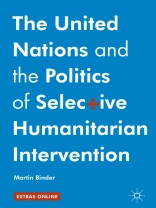This book offers the first book-length explanation of the UN’s politics of selective humanitarian intervention. Over the past 20 years the United Nations has imposed economic sanctions, deployed peacekeeping operations, and even conducted or authorized military intervention in Somalia, Bosnia, or Libya. Yet no such measures were taken in other similar cases such as Colombia, Myanmar, Darfur—or more recently—Syria. What factors account for the UN’s selective response to humanitarian crises and what are the mechanism that drive—or block—UN intervention decisions? By combining fuzzy-set analysis of the UN’s response to more than 30 humanitarian crises with in depth-case study analysis of UN (in)action in Bosnia and Darfur, as well as in the most recent crises in Côte d’Ivoire, Libya and Syria, this volume seeks to answer these questions.
قائمة المحتويات
Introduction.- Chapter 1. UN Security Council intervention in humanitarian crises: A framework for explanation.- Chapter 2. Paths to intervention: A fuzzy-set analysis.- Chapter 3. The Security Council and the war in Bosnia.- Chapter 4. The Security Council and the crisis in Darfur.- Chapter 5. The most recent cases: Côte d’Ivoire, Libya, Syria.- Conclusion.-
عن المؤلف
Martin Binder is Associate Professor in International Relations at the University of Reading. He previously held a position at the WZB Berlin Social Science Center and was a visiting scholar at the Center for European Studies at Harvard University. His research has been published in the Journal of Peace Research, International Studies Quarterly and International Theory, and in other journals.












